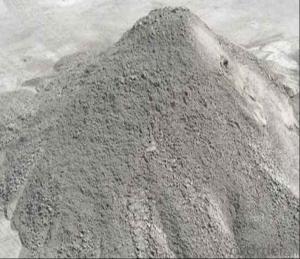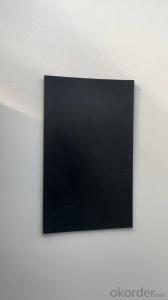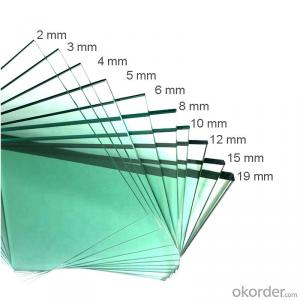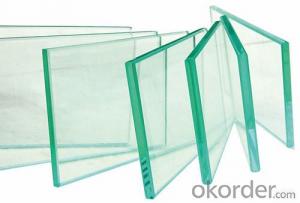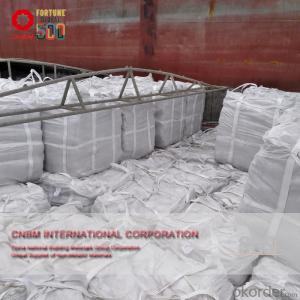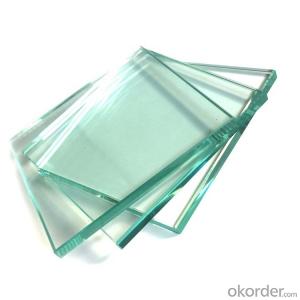PVC waterproof membrane
- Loading Port:
- Qingdao
- Payment Terms:
- TT OR LC
- Min Order Qty:
- -
- Supply Capability:
- 100000 m²/month
OKorder Service Pledge
OKorder Financial Service
You Might Also Like
PVC (polyvinyl chloride) roof membrane
is an excellent high quality polymer waterproof sheet, made of PVC resin by adding plasticizer,
anti-UV agent, anti aging agent, and stabilizer and other processing aids through extrusion
and molding.As the highly recommended product by the Ministry of Construction, it is featured by high tensile
strength, great elongation, good stability, small shrinkage, low temperature performances, good resistance to
weathering and root penetration, and long service life.
Physical Property:
1.Good combination of high elasticity and tensile strength.
2.Fine resistance to static electricity.
3.Excellent resistance to ageing / weathering.
4.Durable,the effective age can be more than 20 years used on exposed surfaces,used on non-exposed surfaces,it can reach 50 years.
5.Fine flexibility at low temperature,adaptable to cold conditions.
6.Root-resistance,can be used on the planting roofs.
7.Fine puncture resistance, joint peel strength and joint shear strength.
8.Fine UV-resistance,no pollution to environment.
9.Easily welding,installing,secure.
10.Easy treatments to the delicate parts of corners and edges.
11.Convenient maintenance with low cost.
Polyvinyl Chloride (PVC) membrane with fiber reinforced layer
on the back is widely used in the roofs of civil buildings,
tunnels, channels, subways, highways, planting roofs, the roofs of steel
frame structure buildings, and etc.
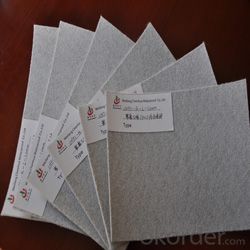
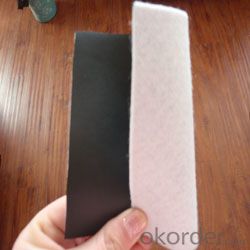
- Q:Can waterproofing membranes be used on green roofs?
- Yes, waterproofing membranes can be used on green roofs. In fact, they are an essential component of green roof systems as they prevent water leakage and protect the underlying structure. Waterproofing membranes are specifically designed to withstand the unique challenges posed by green roofs, such as water infiltration and root penetration, ensuring the longevity and effectiveness of the green roof system.
- Q:Can waterproofing membranes be used on rooftop terraces?
- Yes, waterproofing membranes can be used on rooftop terraces to protect them from water damage and ensure their longevity.
- Q:Can a waterproofing membrane be used on crawl spaces?
- Yes, a waterproofing membrane can be used on crawl spaces. It can effectively prevent moisture from seeping into the crawl space, protecting it from water damage and potential mold or mildew growth.
- Q:Why the roof of the waterproof membrane and insulation rock wool board to do between the isolation layer?
- 3, in the insulation layer on whether to protect the isolation layer according to the construction of the insulation layer on the destruction of the role of the waterproof layer. Since the waterproofing membrane has been completed construction, indicating that the flatness has reached a higher demand, and the insulation layer of the grass-roots flatness requirements do not exceed the requirements of the web paving, so waterproof surface without leveling layer, but may need to do protection Isolation layer.
- Q:Is a waterproofing membrane resistant to UV radiation?
- Yes, a waterproofing membrane is typically resistant to UV radiation. Most waterproofing membranes are designed to be durable and long-lasting, and part of that includes being able to withstand exposure to UV rays. UV radiation from the sun can cause degradation and damage to various materials over time, including waterproofing membranes. However, manufacturers often incorporate UV stabilizers and additives into the membrane's composition to enhance its resistance to UV radiation. These additives help to prevent the breakdown of the membrane's structure, ensuring that it remains effective in preventing water infiltration and maintaining its overall performance for an extended period, even when exposed to direct sunlight. Additionally, some waterproofing membranes may have a protective layer or coating that offers additional UV resistance. It is always recommended to consult the manufacturer's specifications and guidelines to understand the specific UV resistance capabilities of a particular waterproofing membrane.
- Q:Can a waterproofing membrane be used for underwater structures?
- Indeed, underwater structures can benefit from the utilization of a waterproofing membrane. These membranes have been specifically engineered to create a formidable barrier against water infiltration, rendering them appropriate for various applications, including underwater structures. Typically composed of robust materials like reinforced PVC or rubber, these membranes possess exceptional water resistance capabilities and effectively safeguard submerged surfaces by forming a reliable seal. Whether it be a swimming pool, underwater tunnel, or offshore platform, the implementation of a waterproofing membrane can effectively thwart water ingress and preserve the structural integrity. Nonetheless, it is crucial to ascertain that the chosen waterproofing membrane has been meticulously crafted and thoroughly tested for underwater applications to guarantee optimal performance and longevity.
- Q:How does a waterproofing membrane perform in areas with chemical exposure or solvents?
- Waterproofing membranes are not specifically designed to resist chemical exposure or solvents. Although they may offer some resistance to certain chemicals, extended exposure to aggressive chemicals can compromise their effectiveness. These chemicals can degrade the membrane material over time, making it brittle, cracked, or ineffective at waterproofing. To improve the performance of a waterproofing membrane in areas with chemical exposure or solvents, it is advisable to use a specialized chemical-resistant membrane. These membranes are made from tested materials that can withstand various chemicals and solvents. They provide a higher level of protection and durability, ensuring long-lasting performance and preventing damage caused by chemical exposure. It is important to choose the appropriate waterproofing membrane based on the specific chemicals and their concentrations present. Seeking guidance from a professional waterproofing contractor or manufacturer can help in selecting the most suitable membrane for the intended application. Regular inspection and maintenance are crucial to monitor the performance of a waterproofing membrane in areas with chemical exposure. Promptly addressing any signs of deterioration, such as cracks, leaks, or discoloration, can prevent further damage and potential water infiltration. Overall, while a waterproofing membrane can offer some protection in areas with chemical exposure or solvents, it is preferable to use a specialized chemical-resistant membrane for superior long-term performance and durability.
- Q:Can a waterproofing membrane be used in tunnels?
- Yes, a waterproofing membrane can be used in tunnels. Waterproofing membranes are commonly used in tunnel construction to prevent water infiltration and protect the tunnel structure from damage caused by moisture. These membranes are designed to provide a barrier against water, keeping the tunnel dry and secure.
- Q:Can a waterproofing membrane be used in interior or exterior applications?
- Yes, a waterproofing membrane can be used in both interior and exterior applications. In interior applications, such as basements or bathrooms, a waterproofing membrane can be installed on walls or floors to prevent water or moisture from seeping through. This helps to protect the underlying structure from damage caused by water intrusion. In exterior applications, a waterproofing membrane can be applied to the exterior walls or foundations of a building to prevent water from penetrating into the structure. This is especially important in regions with heavy rainfall or high water tables. By creating a barrier against water, the membrane helps to keep the interior of the building dry and free from water damage. Overall, the use of a waterproofing membrane in both interior and exterior applications is essential for ensuring the longevity and durability of a structure by protecting it from water-related issues.
- Q:Are waterproofing membranes resistant to acid exposure?
- Waterproofing membranes can vary in their resistance to acid exposure depending on the specific type of membrane being used. Some waterproofing membranes are designed to be resistant to acid exposure, while others may not be. It is crucial to carefully select the appropriate waterproofing membrane for the specific application and environment where acid exposure may be a concern. It is also advisable to consult with manufacturers or industry experts to determine the best waterproofing membrane solution for acid-prone areas.
1. Manufacturer Overview |
|
|---|---|
| Location | |
| Year Established | |
| Annual Output Value | |
| Main Markets | |
| Company Certifications | |
2. Manufacturer Certificates |
|
|---|---|
| a) Certification Name | |
| Range | |
| Reference | |
| Validity Period | |
3. Manufacturer Capability |
|
|---|---|
| a)Trade Capacity | |
| Nearest Port | |
| Export Percentage | |
| No.of Employees in Trade Department | |
| Language Spoken: | |
| b)Factory Information | |
| Factory Size: | |
| No. of Production Lines | |
| Contract Manufacturing | |
| Product Price Range | |
Send your message to us
PVC waterproof membrane
- Loading Port:
- Qingdao
- Payment Terms:
- TT OR LC
- Min Order Qty:
- -
- Supply Capability:
- 100000 m²/month
OKorder Service Pledge
OKorder Financial Service
Similar products
New products
Hot products
Related keywords


















